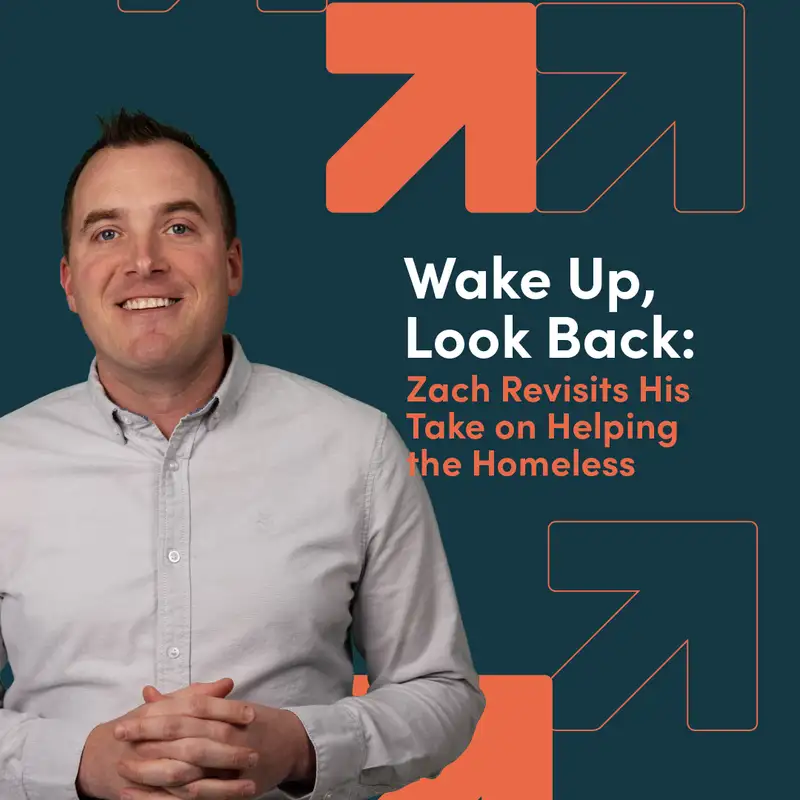Wake Up, Look Back: Zach Revisits His Take on Helping the Homeless
Hello, everyone. Thanks for listening to Wake Up, Look Up, podcast where we connect events happening in real time to the gospel of Jesus Christ. I'm Zach Weihrauch. And in today's episode, we are throwing it back, something we're doing a couple of times this summer where we're taking a look at a former episode that got a lot of traffic online and a lot of feedback from you, our listeners, and reaffirming or reexamining the opinion we advanced here on wake up look up. And today's episode, we're looking back to a conversation we had about homeless camps.
And this was prompted by an action that governor Gavin Newsom, the governor of California, was taking in disbanding homeless camps all over the state of California. And I said this on the episode, but I I visit California pretty frequently, at least once a year. I've seen these camps, from a distance, and they are all over the state. And what governor Newsom was arguing is that these camps are illegal. They are people squatting on public land.
They are hotbeds for disease and drug use and violent crime, and that people do not have a right to inhabit or dwell in public spaces. So we took a look from a Christian perspective, how should we think about this in light of what the bible has to say about love and care for the poor. Now let me say two things in response to the feedback we got on this episode. The first is that we are really losing an ability to nuance a conversation in our culture. Now when you hear a topic like homeless camps for or against them, the the danger is that we want to instantly run to one extreme or the other.
Get rid of them. All homeless people deserve to die, says one extreme. Or the other extreme, which says, no. No. No.
Homeless people should be able to live wherever they want. We should always care for the poor no matter what choices they make. What we try to do on wake up look up is take a nuanced look at something to to say, well, both of those extremes are ridiculous and not in keeping with the Bible. Because the Bible's answer so often kind of bobs and weaves in in and out of various political categories. At times, the Bible sounds very conservative.
At times, it sounds very liberal. That's because the Bible is written without regard for American culture. It's not trying to be compliant with your political ideology. The Bible is simply trying to show the heart and mind and character of God and of his kingdom. And what the bible affirms time and time again are two truths that are not, at least rightly understood, in competition.
One is that we should love our neighbors. That includes our poor neighbors, our homeless neighbors. A major cause of homelessness are things outside of any one homeless person's control. Things like the sin of another person, the the addictions of another person, economic forces, mental illness. There are a lot of things that can conspire together to cause a person to be homeless.
And the bible is relentless in calling us to see the person, the image bearer, the person made in God's image as intrinsically valuable independent of the causes of them being homeless. And yet the Bible is also affirming time and time again individual responsibility, character, work ethic, a call to be and do the things God has called us to be and do. So the same Bible that has Jesus in the gospel of Matthew saying, when I was hungry, you gave me food. When I was naked, you gave me clothing is the same bible that says if a man doesn't work, he should not eat. Those things are not competing.
On the one hand, God is saying to us that if we love him, we will love people made in his image. On the other hand, God is saying part of loving those people is telling them they were meant to work and that there will never be a fulfilling life of subsisting simply on the charity of the federal government or of anyone else. So the first thing is we have to regain our ability to be nuanced, our ability to exist in between political categories. But the second thing is this. There is a difference between the call on an individual Christian's life and governmental policy.
For example, when someone sins against me, the biblical call on my life is to forgive them. But according to Paul in Romans 13, when someone sins against the government, the government is called by God to wield the sword of justice, bringing punishment to bear on them so that so as to keep society from running amok with all kinds of evil. When the government turns, a forgiving cheek to someone, for example, who commits assault, they're not loving the person who's been assaulted. Justice is what love calls for there, and yet Jesus says to me, if someone hits me on one cheek, I'm to give them the other. When we conflate these two, we end up with a government that is shirking its responsibility or individuals who are not surrendered to the kind and loving hand of Jesus.
But we want both of those things. I'm aspiring to be, as should you, more and more of who Jesus wants me to be as an individual Christian, but I'm calling my government, expecting my government to play the role that Jesus has for it to play. Surrender on both a policy level and a personal level. Once again, a nuance distinction that issues like homeless camps require. So if that episode made you mad, go back and listen to it.
Nuance is important, and running to your political corner is not only unhealthy, it doesn't actually solve problems. This episode of Wake Up Look Up was produced by Holly Andrews and Marcus Cunningham. Our topic researcher is Shanna Young. This episode was directed by Andy Hoffman. Our podcast coordinator is Holly Andrews, our production manager, and audio wizard is Marcus Cunningham, with tech and engineering support from Matthew Adel and Landon Hull.
I'm your host, Zach Weirock. Join us for the next episode of Wake Up, Look Up.
Have an article you’d like Zach to discuss? Email us at wakeup@ccchapel.com!
Creators and Guests


